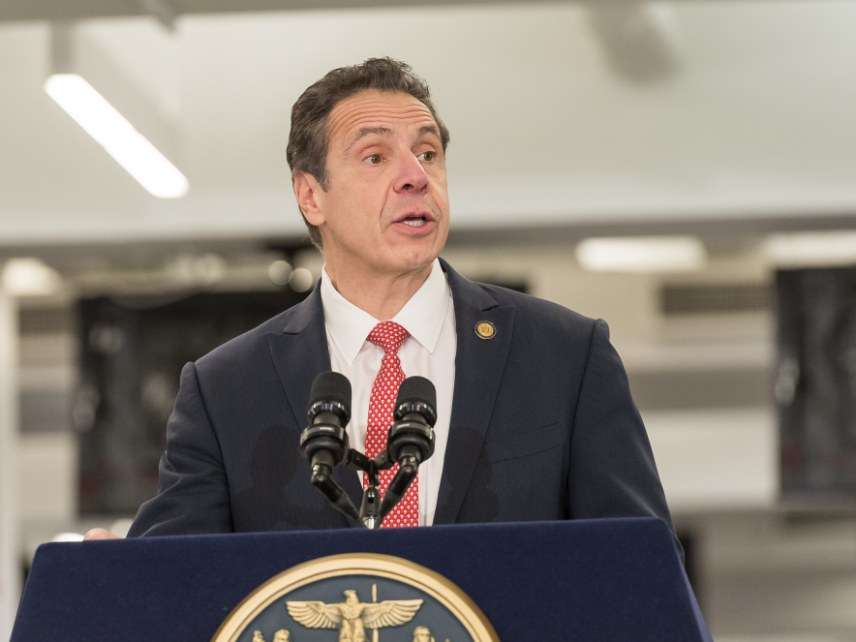Will New York's Recreational Marijuana Policies Be as Dumb as California's?
Gov. Cuomo throws his support behind a ban on home cultivation, possibly on behalf of already entrenched pot groups.

New York may be following California's bad example and legalizing recreational marijuana in all the wrong ways, guaranteeing an oppressive, potentially punitive environment where the government decides the market's winners and losers.
Democratic Gov. Andrew Cuomo's support and recommendation for legalization in New York apparently came with a very significant string attached: no home cultivation allowed.
A month before Cuomo detailed his recommendations for legalization, Marijuana Moment reports, he received a policy statement from the existing medical marijuana industry officials with their own ideas. It an entire chapter devoted to warning against allowing New Yorkers from growing their own marijuana at home.
Kyle Jaeger submitted a records request to get a copy of this 29-page memo from the New York Medical Cannabis Industry Association. Here are the five reasons why the entrenched industry warns against letting people grow their own pot (as summarized by Jaeger):
-
Home grow will make it impossible for the state to eliminate the black market.
-
Home grow will make it impossible for law enforcement to distinguish between legal and illegal products, thus frustrating enforcement efforts.
-
Home grow will undermine the state's harm reduction goal of ensuring that cannabis sold in New York State is grown without noxious pesticides or other contaminants.
-
Home grow will undermine the state's public health interest in ensuring that cannabis sold in New York State is tested, packaged, and labeled correctly.
-
Home grow will cost the state tax revenue, thus hindering the state's ability to fund priorities such as drug abuse treatment and community investment.
Weirdly, "Us growers may not make as much money" did not make the list. But they of course made sure to point out that the state may not make as much money. They know their audience!
Let's dismiss the dumbest of these arguments first. Bans are what prompt black markets to crop up. It's almost comically stupid for a bunch of medical marijuana dispensaries to suggest that legalizing a home-grow operation somehow fosters a black market. And they most certainly know it. But government officials are generally unwilling to admit that they are the cause of, not the solution to, black markets.
The health questions raised by home-grown marijuana are issues that consumers should evaluate for themselves. The industry's position here resembles the arguments of people who try to prevent amateur home chefs from selling their baked goods to the public. In both cases, the public health argument is a fig leaf covering a desire to protect someone's market share.
As for the last point: Just think of how much revenue a state could get if it banned cooking at home entirely, forcing residents to get all their meals from restaurants, thereby requiring everybody to pay more in sales taxes. That's fundamentally the logic here: The organization is arguing that the state should legally ban a behavior unless it produces a revenue stream for the state.
In California, the state's failure to earn revenue and the continued dominance of a marijuana black market stand as indictments of the state's regulations. The taxes are too high. The restrictions are too severe. The hoops to jump through are too numerous. In Los Angeles, the city's entrenched medical marijuana shops got to jump to the front of the line when it came time to hand out recreational marijuana permits. And now the city is dragging its feet in letting new entrepreneurs join the market.
In Los Angeles, the obvious pandering to the established marijuana vendors is fostering a continued black market. If people can't get what they're looking for cheaply and efficiently while still following the law, a certain number of them are going to be willing to break the law. And yes, California does allow for home cultivation for personal use—up to six plants. That's not what's causing a black market any more than allowing people to grow their own corn is what's creating a black market for homemade tamales.


Show Comments (28)